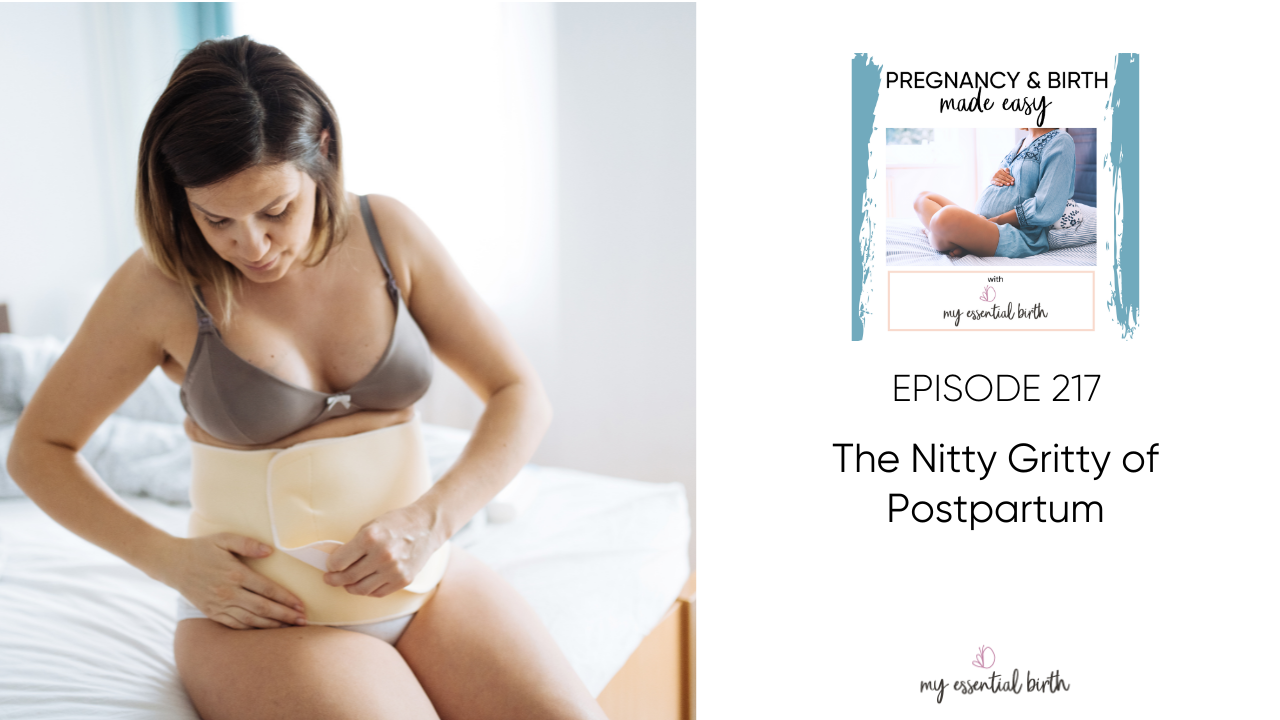The Nitty Gritty of Postpartum

Show Notes:
[2:25] Our Reviewer of the Week, _smileyriley_, said "This podcast was one of the most fantastic resources throughout my entire pregnancy and helped me feel very prepared and informed ahead of my birth this past spring. I had a spectacular birth experience and was able to navigate conversations with my providers confidently to ensure that my baby and I were safe but that my preferences and values were adhered to and respected. I showed this podcast to my doula and will continue telling friends and family about it any chance I get!" 💜
[4:05] This week's episode is going to be really helpful for moms who are currently pregnant and/or immediately postpartum! This is one of those episodes that you can listen to again and again, and then tuck away for when you need it.
[6:57] We're going to start with what to expect when you get home. We've covered what happens immediately postpartum to your body before! See episodes below. Remember when you get home, whether you've had a vaginal birth or a Cesarean birth, you're going to have some bleeding. For the first couple days, bleeding is probably going to be really heavy. It's actually even normal to be passing some blood clots, as long as they're not bigger than the size of a golf ball and not several of them. Get some Maxi pads and have some changes of underwear handy in the bathroom!
[11:26] The bleeding should be over pretty close to the six-week mark for most or a lot of women. Keep in mind that extra movement can cause a little bit more bleeding.
[12:37 ] If you are noticing large blood clots and heavy bleeding, even early on that's not slowing or stopping, those could be warning signs, especially with any kind of pain, cramping, swelling, fevers, etc.
[13:56] Even if you don't have a postpartum doula, you can have someone do a head-to-toe check on you. They can start with your head and ask "Tell me what you're thinking." "Tell me about the birth." "Tell me how you're thinking about your baby." Then head down to your mouth. "What are you eating?" Then down again. "How are your breasts doing?" You just move down the body.
[15:13] Don't make the same mistakes I did. Use your peri bottle! You can rinse your downstairs area and not have to wipe with toilet paper after you use the bathroom.
[15:55] When should you go to the ER? If you are soaking more than one pad every hour, head to your care provider or if it's the weekend, head to the ER.
[16:35] That first poop after baby is born doesn't have to be terrifying. I definitely recommend taking a stool softener. There are also some alternatives which include eating enough green leafy vegetables, getting enough fiber, and taking magnesium citrate.
[17:42] As we know it right now, postpartum depression or postpartum mood disorders very rarely get diagnosed. There's plenty of women (myself included) who did not feel comfortable talking to their provider about it.
- Baby Blues - You're weeping and crying over essentially nothing. You're irritable. You're really tired. You've got mood swings. You have trouble making decisions. It lasts for about two weeks postpartum.
- Postpartum Anxiety/Depression - You're feeling the same symptoms above for longer than two weeks and it's accompanied by panic attacks where you can't feel joy, you have obsessive or intrusive thoughts, you have fears of something happening to your baby or thoughts of self-harm.
[22:14] Your ability to mother is not related to how you're feeling postpartum. Just because you're feeling all those things, does that make you a bad mother? The fact that you are thinking about these things and concerned about how is it affecting you as a mom and as a person means that you have a desire to DO something about it.
[22:43] Things that you can do for leaky boobs include like having a pad liner or pads that collect the milk. You can take that milk and pour it into a bottle and use it later.
[24:20] Night sweats are caused by a fluctuation of hormones, releasing water, and your body is doing all kinds of things to get back to normal. Just be prepared to change your sheets once or twice!
[25:45] How can you prepare for postpartum? We now have a My Essential Birth Postpartum Course! It's going to take you everywhere from the decisions that you make right before birth and immediately postpartum, all the way through to about a year of your baby. It will cover those big things like milestones and breastfeeding and what to expect from your baby and your body during that time.
[28:56] Do yourself a favor and set up stations! It gives you opportunities to just have what you need wherever you end up. It has diapers, wipes, cream, changes of clothes etc. Then you've got your nursing stations with breast pads, nipple cream, nipple shields, a phone charger, snacks and food, or just anything that's gonna keep you comfortable during that time.
[31:34] I think it's really important to talk to your birth partner about what to expect. Have them listen to this podcast episode! How can you work together to get through this postpartum phase?
[33:01] If possible, meal prep before baby is born! Making a couple of meals that you know are really nourishing and good for you postpartum while you're still pregnant can be a really good way to go.
[34:42] Postpartum is obviously going to bring a lot of changes. If you don't know your village yet, now's the time to figure that out,
[36:33] postpartum is not for the faint of heart and there is a lot that happens to us. It's not pretty, and it can be a little messy for sure. It's okay to just be for a moment. There's your permission to just be postpartum, enjoy your baby, don't stress about the other things, and as much as you can, lean on that village.
To Leave a Review ⭐️
- Open Apple Podcasts
- Find “Pregnancy & Birth Made Easy” podcast
- Select “Ratings and Reviews”
- Click the stars!
- Select “Write a Review” and tell us what was the most amazing, comforting, eye-opening thing that you loved!
ALL the best,

Links Mentioned:
- 3 Free Exercises
- FREE Postpartum Guide
- Our Postpartum Must Haves
- Our Postpartum Episodes
- Episode 90: Vaccines: What You Need to Know
- Episode 108: Bringing Baby Home: Mom & Dad Talk Postpartum
- Episode 156: The First 24 Hours Postpartum: Mom & Baby
- Episode 164: Postpartum Checklist for Mom
- Episode 188: Motherhood or Postpartum Depression: Navigating the Rollercoaster of Life as a Mother & Knowing When To Seek Help
- Episode 196: Postpartum Doula, Gigi Vincent, Answers Your Questions!

